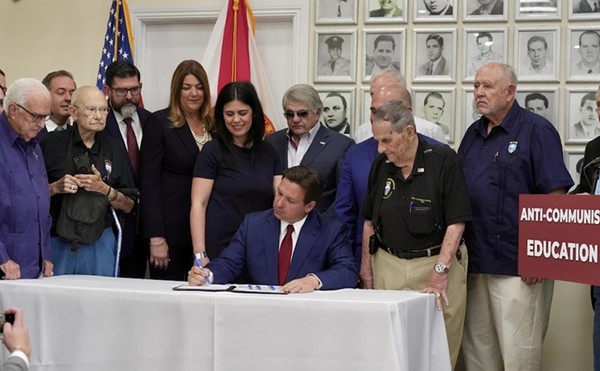For the past three months, Linda Stewart has hopped aboard her 10-year-old Huffy bicycle and pedaled to the four corners of the southeast Orange County district she hopes will elect her to the county commission this fall.
Stewart decided on the Huffy approach because she wanted to qualify for office by collecting voter signatures rather than paying a $2,535 qualifying fee. In fact, the filing fee is so high that many candidates choose, like Stewart, to ask more than 3,000 people to sign a qualifying petition. Seven of the 12 county commission candidates filed for this fall's elections by collecting signatures even though the county's petition requirement is more prohibitive than state guidelines.
"To have to get that many signatures is not right," says Stewart, past president of CountyWatch, a non-partisan watchdog agency. "Nobody but Orange County charges this much. It's meant to discourage people from running for office."
If that is the motive, it seems to be working fairly well. Only two candidates will challenge County Chairman Richard Crotty this fall even though hardly anyone is impressed with his leadership skills. He also would seem vulnerable because he has only been in office for two years, having taken over Mel Martinez's term in 2000.
Three candidates, including Linda Stewart, have filed to run against Clarence Hoenstine; and three have filed against District 6 Commissioner Homer Hartage. All of the challengers are running campaigns on shoestring budgets; the incumbents, meanwhile, should each finish with contributions in the six-figure range. Crotty has raised close to a half- million dollars.
Ironically, incumbent Bob Sindler of Apopka is running unopposed for District 2 office. Sindler was the lone commissioner to speak out for less prohibitive measures when the county considered revising its filing requirements in 1999. He argued that Orange County should be more in line with state guidelines, which require that candidates gather signatures of 1 percent of the registered voters in their districts. The county requires 3 percent.
"I'd hate to see a process where individuals would not be able to qualify due to unnecessarily high requirements," Sindler said. "I think it is fundamentally fair to let people get on the ballot, although it makes it easier for people to challenge us in the next [election]."
But Sindler, along with Hartage, was voted down 4-2. The most vocal critic of the change was former Chairman Martinez. "I don't support this," he said. "I think you're making it too low a number. I think it is going to complicate elections by the ease of people getting a few signatures and being on the ballot."
In other words, Martinez didn't want to complicate elections by giving an opportunity to candidates whose names weren't Mel Martinez. How many candidates are too many for a reasonable ballot is no easy calculation, of course. But the U.S. Supreme Court has ruled that eight candidates does not dilute voter choice or produce what is known as ballot clutter.
"Adding one, two or three people shouldn't get anybody's panic up," says Richard Winger, publisher of the newsletter Ballot Access News.
Alternative methods of qualifying wouldn't be such a problem if Florida, as well as Orange County, kept its filing fees reasonable. Instead, Florida requires that candidates for state office pay 6 percent of the annual salary of the office being sought (4 percent for nonpartisan races). Orange County charges 3 percent.
"Florida's filing fees are huge compared to filing fees in other states," Winger says. "Generally, filing fees ... are never greater than 1 percent of the annual salary of the office being sought."
Perhaps a reduction in fees would help produce new leaders unafraid to face a challenge. "For the voter the question is, do I have enough real choices?" says Bruce Altschuler, a political scientist at State University of New York, Oswego. "Are the ballot-access requirements liberal enough so I have a choice between candidates who differ on major issues?"


















